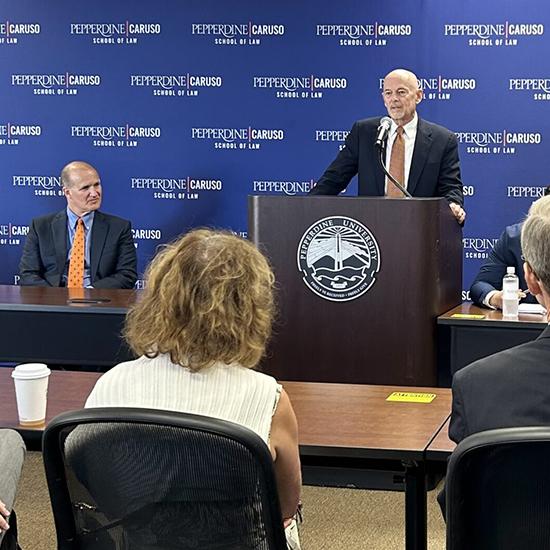Pepperdine University Hosts International Prison Reform Experts for Symposium on First-Ever Multiyear Study of Colombia’s Prison System

On Thursday, October 26, 2023, Pepperdine University’s Center for Faith and the Common Good hosted a virtual symposium entitled “Human Flourishing and Justice: Offender Rehabilitation and Restorative Prisons.” The symposium featured speakers from Pepperdine, Prison Fellowship International, the Senate of Colombia, and the National Penitentiary and Prison Institute of Colombia, and centered its discussion around a multiyear study in Colombia’s prison system to measure the efficacy of international prison programs in offender rehabilitation, recidivism reduction, and general correctional reform.
Opening the discussion was Pepperdine president Jim Gash (JD ’93), who is also a co-director for the Center of Faith and the Common Good. He discussed the center’s scholarly investigations of how faith and religion impact flourishing and how as a platform to integrate scholarship, student engagement, and global impact, the center collaborates with scholars and thought leaders to develop and enact innovative ideas around the world. “This partnership is a perfect example of how Pepperdine’s Christian faith can partner with important friends and other leaders as well,” he said. "Under the leadership of Byron Johnson and his relationship with [Prison Fellowship International], we fully expect this to become a model for global engagement around the world.”
Prison Fellowship International president and CEO Andy Corley expressed his excitement for the partnership and the impact such a unique opportunity will have on the prison landscape. “The opportunity to study the results of [this program] is just terrific. We’re not afraid of quality data and empirical study, in fact it drives us and we are looking forward to the collaboration, and all that we will learn from this [opportunity],” said Corley. Prison Fellowship Colombia is one of Prison Fellowship International’s most successful national ministries and reaches more than 20 percent of the prison population. They also work outside of the prison with families, a vital aspect of breaking the cycle of crime and the reason why Colombia was chosen as the initial study location.
Sung Joon Jang, visiting scholar at the School of Public Policy and research professor of criminology and co-director of the Program on Prosocial Behavior at Baylor University, shared an overview of the project, including programs currently operating in Colombia, research locations, details and data captured from surveys, and demographic and criminal background information provided by the Colombian National Penitentiary and Prison Institute.
Johnson, co-executive director of Pepperdine University’s Center for Faith and the Common Good, included additional details, mentioning the one-of-a-kind integrated database being created with data collection. By tracking prisoners in tandem with studying their families, researchers hope they will be able to help explain how people can live crime-free and apply these findings on a global scale.
“The beautiful thing about this is that Prison Fellowship International is operating in [more than] 121 countries, [which is] about 60 percent of the world's prisons.” Johnson added, “It is not an understatement to say that we really could have an effect on how prisons operate around the world at a time when [that information] is so desperately needed.”
Prison Fellowship Colombia Executive Director Lácides Hernández, who has been dedicated to transforming the lives of prisoners and their families in Colombia for more than 35 years, is working to counteract the country’s culture of cyclical violence and murder. Prison Fellowship International has served as an inspiration and resource for Hernández, as he has utilized key learnings when working with prisons and prisoners nationally. “This project is an example [of how] faith can also be attached to good work. Faith needs to drive us to change the environment that we are in and is also a chance to show people that science and faith are not incompatible,” Hernández shared. “Through academia, we can make a very important contribution to our society.”
Cameron McCollum (JD ’17), director of the Pepperdine Caruso School of Law Sudreau Global Justice Institute and administrative director of the Center for Faith and the Common Good, closed the event by sharing the work that the University’s Sudreau Global Justice Institute does in their mission to partner with governments around the world and aid them in providing all people with timely access to justice. Additionally, McCollum shared his hopes on potential collaboration opportunities between the Sudreau institute and Prison Fellowship International.
“The work that Prison Fellowship International is doing in prisons around the world is truly unrivaled in both scope and impact, and the Sudreau Global Justice Institute would like to offer to all our friends to the extent that we can be of service,” McCollum said. “We would love to serve in any capacity that we can.”
Research has already begun as pre-test administration was initiated the week of October 30, 2023. The studies will be conducted at a staggered rate, with some projects launching in spring 2024, which will best accommodate the range of programs being studied across different communities and in different prisons. This initiative has been projected to continue for three to five years but will likely continue for an unspecified period of time.
The symposium is available to watch on the Center for Faith and the Common Good website.